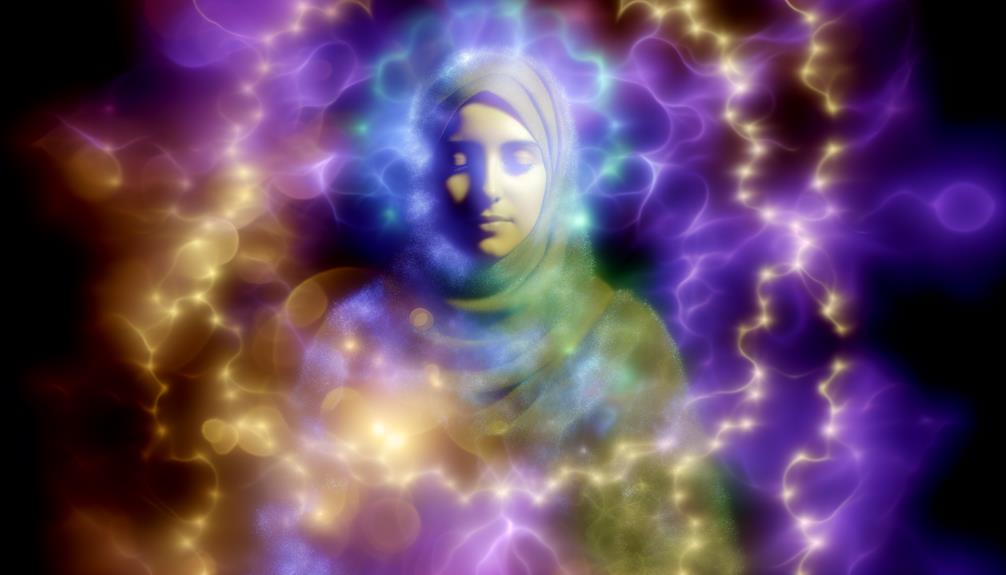Meaning of the Name Aura
The name 'Aura' originates from ancient Greek, where it signified a gentle breeze or soft wind. It derives from the word 'αὔρα' (aura) and is linked to Greek mythology, where Aura is a Titaness associated with breezes and fresh air.
In Roman and Hindu traditions, it symbolizes unseen spiritual forces and a person's energy field. Modern interpretations extend to spiritual, psychological, and aesthetic dimensions, often representing an individual's inner essence and unique atmosphere.
The name's cultural and historical richness makes it a fascinating subject for further exploration.

Key Takeaways
- Aura means a gentle breeze or soft wind, originating from ancient Greek.
- It represents a luminous energy field reflecting spiritual and emotional states.
- In mythology, Aura is a Titaness associated with fresh air and breezes.
- It symbolizes unseen forces of nature, divine presence, and ethereal qualities.
- The name embodies spiritual, psychological, and aesthetic dimensions, linked to energy fields and mystical presence.
Etymology of Aura
The etymology of the name 'Aura' can be traced back to ancient Greek, where it originally denoted a gentle breeze or soft wind. The term 'αὔρα' (aura) was used in classical texts to describe the faint, invigorating breath of air, often associated with a sense of tranquility and subtlety.
Linguistically, the word is derived from the root 'αὔω' (aúō), meaning 'to blow' or 'to breathe.' This nuanced origin highlights the name's intrinsic connection to nature and the ephemeral qualities of air movement.
The semantic shift from a physical phenomenon to a personal name encapsulates a broader cultural appreciation for the delicate and intangible aspects of existence, reflecting a deep-seated reverence for the natural world in ancient Greek thought.
Ancient Roman Significance
Ancient Roman culture imbued the name 'Aura' with a multifaceted significance that extended beyond its Greek origins.
The term 'Aura' in Latin literature often referred to a gentle breeze or the air itself, symbolizing subtlety and the unseen forces of nature. Romans associated 'Aura' with divine presence and ethereal qualities, reflecting their reverence for nature's intangible elements.
In artistic and literary contexts, 'Aura' frequently appeared in descriptions of idyllic landscapes and divine interventions, conveying tranquility and divinity. This usage highlighted the Romans' appreciation for the delicate balance between the natural and supernatural.
Additionally, 'Aura' was sometimes personified in Roman mythology, embodying the delicate and elusive essence of life, further enriching its cultural resonance.
Greek Mythological Connections
Building on its Roman significance, the name 'Aura' also holds rich connections within Greek mythology, where it is intertwined with narratives of divine figures and natural phenomena.
In Greek mythology, Aura is a Titaness associated with the fresh, cool air of early morning. She is often depicted as a minor deity of breezes and the gentle wind. Aura's mythological tale involves her transformation into a stream by Zeus, highlighting her fluid and ephemeral nature.
Her story captures the essence of fleeting beauty and the delicate balance between nature and divinity. This mythological context enriches the name 'Aura,' imbuing it with connotations of grace, fleeting beauty, and the ethereal qualities of the natural world.
Aura in Modern Languages
The name 'Aura' exhibits a rich etymology and diverse roots across various modern languages, each contributing unique cultural significance.
Its pronunciation and usage can vary widely, reflecting local linguistic nuances and traditions.
Examining these aspects provides a thorough understanding of how 'Aura' is perceived and articulated in contemporary contexts.
Etymology and Roots
Etymologically, the name 'Aura' finds its roots in the ancient Greek word 'aura,' which means breeze or soft wind. This origin highlights the name's connection to nature and its gentle, ephemeral qualities.
The term 'aura' was adopted into Latin with similar meanings, and it has permeated various modern languages. In Spanish and Italian, 'aura' retains its original connotation of a light breeze.
Additionally, in English, 'aura' has evolved to encompass a broader semantic range, including metaphysical contexts, where it denotes a subtle, pervasive quality or atmosphere surrounding a person or thing.
The etymological journey of 'aura' through different languages underscores its enduring and adaptable nature, reflecting both its ancient origins and contemporary relevance.
Cultural Significance
In contemporary culture, the name 'Aura' possesses significant associations across various modern languages, reflecting its multifaceted meanings and rich historical context.
In Spanish and Portuguese, 'aura' signifies a gentle breeze or subtle wind, evoking a sense of calm and natural beauty.
Meanwhile, in Finnish, 'Aura' denotes the goddess of the dawn, imbuing the name with a celestial and mythological resonance.
Additionally, in contemporary English, 'aura' often refers to a distinctive atmosphere or quality surrounding a person or thing, suggesting a metaphysical or spiritual presence.
These varied interpretations underscore the name's versatility and broad cultural appeal, making 'Aura' a name that resonates deeply across different linguistic and cultural landscapes.
Pronunciation Variations
Pronunciation of the name 'Aura' varies significantly across modern languages, reflecting the phonetic nuances and linguistic traditions of each culture.
In English, 'Aura' typically features a soft initial vowel sound, articulated as 'AW-ruh.'
In Spanish, the name is often pronounced 'OW-rah,' emphasizing a more rounded vowel sound.
Italian speakers might say 'AH-oo-rah,' incorporating a diphthong.
French pronunciation tends to be 'OH-rah,' with a nasal quality.
Each variation offers a unique auditory flavor, influenced by the specific phonological rules and vocal tendencies of the respective languages.
These differences underscore the adaptability and global resonance of the name 'Aura,' making it a fascinating subject for linguistic and cultural study.
Spiritual and Mystical Meanings
The name Aura, with its ethereal connotations, is often associated with the concept of a subtle, luminous energy field believed to surround living beings, reflecting their spiritual and emotional state.
This energy field, or aura, is considered to be a manifestation of an individual's inner essence, encompassing colors and vibrations that provide insights into their mental and spiritual well-being.
In various mystical traditions, an aura is perceived as an indicator of one's health and spiritual purity. Practitioners of energy healing and esoteric disciplines often interpret the colors and intensities of auras to diagnose imbalances and promote holistic wellness.
Therefore, the name Aura symbolizes a profound connection to the unseen, spiritual dimensions that influence human existence.
Cultural Interpretations
The name Aura has been imbued with various meanings across different cultures, often reflecting its historical contexts, mythological associations, and evolving modern cultural significance.
In ancient mythologies, Aura frequently appears as a symbol of ethereal beauty and divine presence, while contemporary interpretations highlight its resonance within new-age spiritual and artistic communities.
This section will examine these cultural interpretations, providing a thorough analysis of the name's multifaceted significance.
Historical Contexts of Aura
Examining the historical contexts of the name 'Aura' reveals a rich tapestry of cultural interpretations spanning various civilizations and eras. Historically, the name has been imbued with diverse meanings:
- Classical Antiquity: In ancient Greece, 'Aura' was associated with gentle breezes, often linked to deities representing the natural elements.
- Medieval Europe: The name found resonance in the Christian tradition, symbolizing divine breath or spiritual presence.
- Modern Usage: Today, 'Aura' is frequently interpreted in metaphysical contexts, representing an energy field surrounding living beings.
These interpretations underscore the name's versatility and its enduring appeal across different epochs. By tracing these varied cultural significances, we gain insight into how 'Aura' encapsulates both tangible and intangible aspects of human experience.
Aura in Mythology
Delving into various mythological traditions, 'Aura' emerges as a multifaceted symbol often intertwined with themes of nature, divinity, and ethereal presence.
In Greek mythology, Aura is a Titaness associated with the gentle breeze, embodying the delicate interplay between the mortal and divine. Her narrative, marked by tragedy and transformation, reflects deeper metaphysical concepts.
Similarly, in Roman lore, the term 'aura' signifies the subtle breath of air, linking it to spirituality and the divine spirit.
In Hindu mythology, the concept of 'aura' (or 'aura shakti') symbolizes a person's spiritual energy field, indicating purity and cosmic connection.
These interpretations across cultures underscore 'Aura' as a profound emblem of unseen forces and spiritual essence, enriching its mythological significance.
Modern Cultural Significance
In contemporary culture, the name 'Aura' embodies a blend of spiritual, psychological, and aesthetic dimensions, reflecting its broad applicability and resonance. Its significance is multifaceted:
- Spiritual Connotations: Often associated with energy fields and chakras, 'Aura' suggests a mystical presence or halo, reinforcing its transcendental appeal.
- Psychological Interpretation: In psychology, 'Aura' can denote an individual's unique atmosphere or personality, indicating the intangible qualities that define personal essence.
- Aesthetic Appeal: In creative fields, 'Aura' is synonymous with beauty and elegance, frequently used in branding and art to evoke a sense of allure and sophistication.
Popularity Over Time
The popularity of the name Aura has experienced significant fluctuations over the decades, reflecting broader cultural and societal trends. In the early 20th century, Aura was relatively uncommon, with sporadic usage in various regions.
The name saw a modest rise in the mid-20th century, possibly linked to a growing fascination with unique and ethereal names. However, it remained relatively obscure compared to more conventional choices.
The late 20th and early 21st centuries have witnessed a renewed interest in the name, coinciding with a cultural shift towards embracing non-traditional and distinctive names. Data from naming databases indicate that while Aura is not a mainstream choice, its usage has steadily increased, suggesting a growing appreciation for its unique and mystical qualities.
Famous Namesakes
Amidst the growing interest in the name Aura, several remarkable individuals have borne this distinctive name, further contributing to its allure and recognition. Their achievements span various fields, adding layers of cultural and social significance to the name.
Notable mentions include:
- Aura Dione: A Danish singer and songwriter known for her unique musical style, blending pop with folk elements.
- Aura Herzog: The former First Lady of Israel, recognized for her contributions to social causes and public service.
- Aura Cristina Geithner: A prominent Colombian actress and singer, celebrated for her work in Latin American television and music.
These individuals exemplify the diverse talents and influential roles carried by those named Aura, enhancing its prestige and appeal.
The Name in Literature
Literary works have often imbued the name Aura with a sense of mystique and ethereal beauty, reflecting its evocative qualities.
In Gabriel García Márquez's 'One Hundred Years of Solitude,' Aura embodies an enigmatic character whose presence is almost otherworldly, enhancing the novel's magical realism.
Similarly, in Carlos Fuentes' novella 'Aura,' the titular character serves as a conduit between reality and illusion, intensifying the narrative's dreamlike ambiance.
The name Aura frequently appears in poetry, symbolizing an intangible, often supernatural essence. This literary use underscores its connotations of light, air, and ethereal presence.
Therefore, the name Aura in literature is not merely a label but a symbol of transcendence, weaving deeper layers of meaning into the text.
Conclusion
To conclude, the name Aura encapsulates a rich tapestry of meanings and cultural significance, spanning from ancient Roman roots to Greek mythology, and permeating modern languages and spiritual discourse.
Its enduring popularity and evocative connotations in literature and among famous namesakes highlight the name's timeless allure.
Such a multifaceted name, like a prism, reflects diverse interpretations and intriguing historical layers, making it a subject of continuous fascination and scholarly interest.






